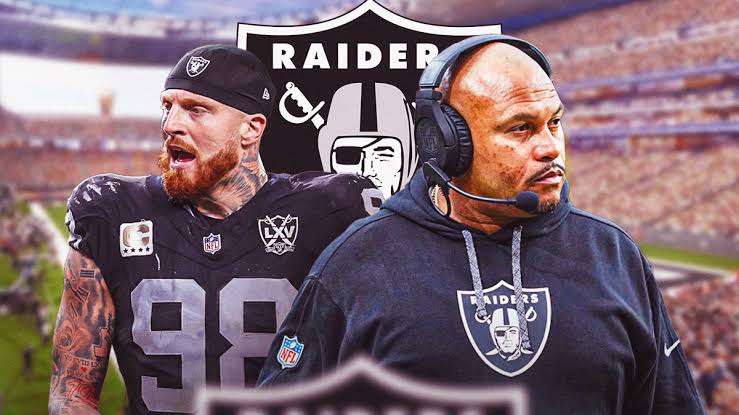As the NFL season reaches its midseason mark, the Las Vegas Raiders find themselves at a crossroads. With a dismal 2-7 record, the team is struggling to stay competitive in the hyper-competitive AFC West, and many have speculated that the Raiders could be prime candidates to sell off veteran players at the trade deadline. However, despite their poor performance, the team has made it clear that they are not looking to enter a full-scale rebuild by becoming sellers ahead of the trade deadline.
The Case for Selling
A 2-7 record is often a signal that a team should evaluate its future. For the Raiders, who have had a tumultuous season, the idea of selling key players in exchange for future assets makes sense. Players like running back Josh Jacobs, defensive end Maxx Crosby, and cornerback Marcus Peters are all experienced, high-quality veterans whose value could be maximized in a trade. Given the team’s lack of playoff contention, many analysts believed the Raiders should look to move such assets to accumulate draft picks and young talent to rebuild for the future.
In addition, the coaching situation remains uncertain. Head coach Josh McDaniels, who is in his second year at the helm, has faced significant criticism for the team’s lackluster performance, and his job security has been called into question. With the team spiraling and no clear path to a playoff berth, moving on from veterans in exchange for picks and resources could provide the Raiders with a clean slate moving forward.
The Raiders’ Commitment to a Competitive Future
However, the Raiders’ front office, led by general manager Dave Ziegler and owner Mark Davis, has decided against a fire sale. Instead, they are holding firm, signaling their intent to remain competitive in the short term. Although this may seem like a curious decision to some, the Raiders are betting on a stronger second half of the season and are attempting to build a competitive roster for the future, rather than fully embracing a rebuild.
Several factors likely influenced this decision. For one, the franchise has already made substantial investments in key players, including the acquisition of quarterback Jimmy Garoppolo and the signing of star running back Josh Jacobs to a one-year contract. Trading away these assets could send the wrong message to both the locker room and the fanbase. It could signal that the Raiders are giving up on the season, which might not align with the franchise’s culture and commitment to winning.
In addition, the front office may have concerns about the long-term health of their rebuild. Trading veterans could lead to an extended period of mediocrity or worse, and with the Raiders’ history of coaching turnover, they may want to maintain some semblance of competitiveness to avoid a complete organizational collapse.
The Tough Reality of the AFC West
The Raiders’ decision to stay active in the market despite a 2-7 start is also likely influenced by the competitive nature of the AFC West. With the Kansas City Chiefs still a perennial powerhouse and the Denver Broncos and Los Angeles Chargers constantly retooling, the Raiders may be focused on maintaining relevance in a division that has become increasingly difficult to navigate.
While it’s true that the Raiders are well behind the Chiefs, they may believe that with a few adjustments or player returns from injury, they can make a push for a playoff spot next season. The team could also be hoping that their strong veteran presence will serve as a stabilizing force for younger players, particularly in a season where many teams are facing unexpected challenges.
Looking Ahead: The Road to Relevance
While the decision to hold steady may not sit well with some fans who are eager for a rebuild, it’s clear that the Raiders are focusing on finding balance between the present and the future. They still have valuable pieces to build around, such as Crosby, Jacobs, and emerging stars like tight end Michael Mayer and defensive lineman Tyree Wilson. The focus may shift toward optimizing their current roster and identifying areas to improve via free agency or the draft.
For now, the Raiders remain in “win-now” mode, a position that could shift depending on how the rest of the season plays out. With key players like Garoppolo, Jacobs, and Crosby still in the fold, Las Vegas will attempt to make some noise in the second half of the season, even if they are not in playoff contention. This decision to stay competitive through the trade deadline signals that the franchise is not quite ready to embrace a full rebuild — but also understands that improvement is necessary.
In the ever-changing landscape of the NFL, the Raiders’ 2024 campaign remains a crucial one. Whether they finish strong or fall further behind, their decisions at the trade deadline will impact their future direction. For now, they’re betting on incremental improvement and an eye toward a better 2025, refusing to surrender hope despite their challenging start.


